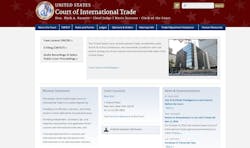A U.S. federal court on Wednesday blocked most of Donald Trump's sweeping import tariffs from going into effect, ruling that the president had overstepped his authority with the across-the-board global levies.
The ruling – which is sure to be challenged – marks a significant setback to the Republican leader as he bids to redraw the United States' trading relationship with the world by forcing foreign governments to the negotiating table through a series of tough new levies.
The court's order could spell a premature end to Trump's international trade war as it bars Trump’s most sweeping tariffs, effectively erasing most of the trade restrictions Trump has announced since taking office.
Tariff Webinar
Next week on Wedensday, June 4, editors from IndustryWeek parent company Endeavor Business Media, along with economic development, engineering and tooling experts, will discuss the costs of reshoring manufacturing to the United States. Click here to register for the free event.
Since coming to power, Trump has upended global trade and roiled financial markets with a stop-start rollout of levies that are aimed at punishing economies that sell more to the United States than they buy.
An administration spokesman blasted the court's ruling.
“It is not for unelected judges to decide how to properly address a national emergency,” administration spokesman Kush Desai said in a statement. “President Trump pledged to put America first, and the administration is committed to using every lever of executive power to address this crisis and restore American greatness.”
Trump unveiled sweeping tariffs on most trading partners on April 2, with a baseline 10%, plus steeper duties on dozens of economies, including China and the European Union.
The ruling also quashes duties that Trump imposed on Canada, Mexico and China separately using emergency powers.
Markets were thrown into turmoil but calmed after he paused the larger tariffs for 90 days. He also suspended some of the higher duties pending negotiations with individual countries and blocs.
'Unconstitutional'
The three-judge Court of International Trade was ruling in two separate cases -- brought by businesses and a coalition of state governments -- arguing that the president’s actions violated the power of purse given to Congress under the constitution.
More Tariff Coverage
Dealing with on-again/off-again tariff announcements has been a major theme of 2025. IndustryWeek coverage includes:
- 50% European Tariffs Paused: DC Watch
- Trump Fires New Tariff Threats at Apple and EU
- Shifting Strategy in a Weakening Economy
- How a Robotics Company Is Leveraging Its Competitive Advantages to Manage Tariff Disruption
- Tariff Shocks and How to Cope (Commercial Vehicle Edition)
- Guiding a Manufacturing Business through Tariffs: Webinar Recap
“The court does not read IEEPA to confer such unbounded authority and sets aside the challenged tariffs imposed thereunder.”
The court, which adjudicates civil cases arising from trade disputes, said that any interpretation of the IEEPA that “delegates unlimited tariff authority is unconstitutional,” according to court documents.
'Extraordinary Threat'
The IEEPA authorizes the president to impose necessary economic sanctions during an emergency "to combat an unusual and extraordinary threat," the bench said.
Trump cited the IEEPA when he said trade deficits and the threat posed by the ingress of drugs into the United States justified widespread tariffs.
The decision revoking that move gave the White House 10 days to complete the bureaucratic process of halting the tariffs, although the administration is almost certain to appeal.
The Justice Department has defended Trump's trade strategy in court, insisting that the judiciary has very limited authority over his actions and sparking criticism that the White House was attempting to usurp the power of the other branches of government.
Trump has claimed that Americans will reap the benefits of his "America First" trade posture, pointing to early successes in deals struck with Britain and with China, the world's second-largest economy.
U.S. Treasury Secretary Scott Bessent told Bloomberg Television on Friday the lower 10% tariff rate was “contingent on countries or trading blocs coming and negotiating in good faith.”
But Trump sent markets into a tailspin by threatening to hit EU goods with a 50% tariff from June 1, saying talks were “going nowhere” as negotiations with the powerful trade bloc failed to yield progress.
Brussels recently threatened to hit US goods worth nearly 100 billion euros ($113 billion) with tariffs.
Wall Street shares briefly bounced on Tuesday after Trump delayed the levies over the long holiday weekend -- although markets were down again Wednesday.
Analysts also warn that the cost of the tariffs will likely be passed on to US consumers, raising inflation and potentially leading the US central bank to hold interest rates higher for longer, further impacting financial markets.
© Agence France-Presse
About the Author
Agence France-Presse
Copyright Agence France-Presse, 2002-2025. AFP text, photos, graphics and logos shall not be reproduced, published, broadcast, rewritten for broadcast or publication or redistributed directly or indirectly in any medium. AFP shall not be held liable for any delays, inaccuracies, errors or omissions in any AFP content, or for any actions taken in consequence.
